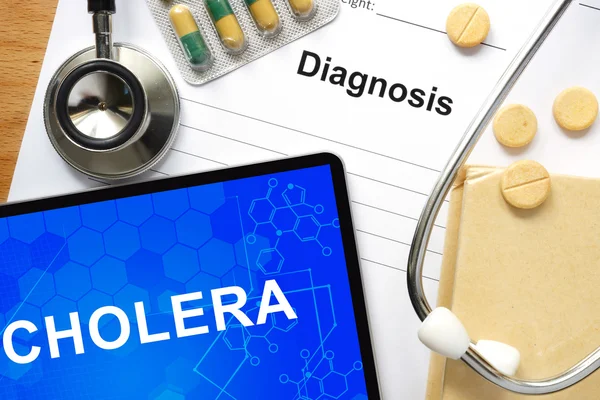Boosting Cholera Treatment: Bacterial Defense System Enhances Antibiotic Power – A recent study has discovered that bacteria have an immune system that protects them against viruses known as bacteriophages. This immune system is made up of several molecular defense systems, one of which is called CBASS (cyclic-oligonucleotide-based antiphage signaling). CBASS is activated when Vibrio cholerae is attacked by bacteriophages, causing the infected cells to die. A research team led by Professor Dr. Ana Brochado from the Universities of Tübingen and Würzburg has shown that antifolate antibiotics activate the CBASS defense system even in the absence of bacteriophages, leading to the cell death of Vibrio cholerae.
This discovery has the potential to enhance the effectiveness of antibiotics against cholera, a severe and potentially lethal enteric bacterial infection caused by Vibrio cholerae[1].
Key findings:
- Bacteria’s “suicidal” immune system (CBASS) enhances the effect of specific antibiotics against cholera. This system, which activates self-destruction when attacked by viruses, is unexpectedly triggered by antifolate antibiotics, boosting their efficiency in killing Vibrio cholerae.
- Antifolates, one of the oldest known antibiotic classes, have a hidden mode of action. Their effectiveness is amplified by activating CBASS, revealing new insights about their effectiveness even after decades of use.
- This discovery opens doors for improved cholera treatment:
- Combination therapy: Exploring the potential of combining antifolates with other antibiotics or phage therapy for enhanced bacterial control.
- Targeted therapies: Developing strategies to directly exploit CBASS for more efficient pathogen elimination.
- Optimizing antibiotic usage: Gaining a deeper understanding of antibiotic modes of action can help prevent resistance development and promote responsible antibiotic use.
- Understanding the complex interplay between antibiotics and bacterial defense systems is crucial for fighting infections effectively. This research paves the way for smarter antibiotic strategies against not only cholera but also other bacterial threats.
What is the role of biofilms in bacteria’s immune system?
Biofilms are communities of bacteria that adhere to surfaces and are embedded in a self-produced extracellular matrix. Biofilm formation allows bacteria to evade the immune response and develop antimicrobial resistance, making them more difficult to treat. Biofilm-associated microorganisms exhibit an altered phenotype with respect to growth rate and gene expression, including the ability to resist antimicrobial treatments and host immune responses. While there are similarities in the host response to planktonic and biofilm bacteria, specific immune responses toward biofilms have not been well studied. Biofilms can impact antimicrobial efficacy, as well as the immune response, contributing to antimicrobial resistance and allowing the establishment of persistent/chronic infections.
However, the search results do not provide information on the role of biofilms in bacteria’s immune system.
ALSO READ: Researchers Uncover Link Between Inherited Genes and Rare Blood Cancer










